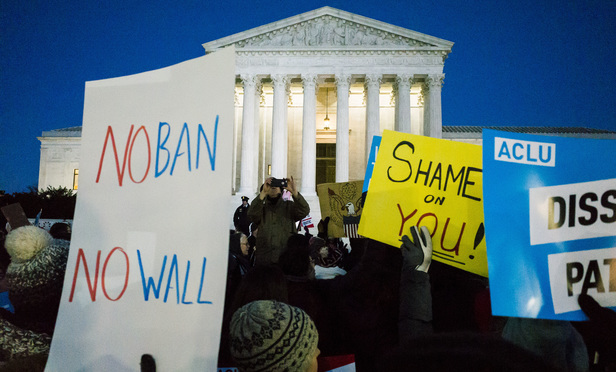Wall has defended that new order at the district courts in Maryland and Hawaii and then the appeals courts in the Fourth and Ninth circuit. In fact, Fourth Circuit Judge J. Harvie Wilkinson had to recuse himself because Wall is married to his daughter.
Wall returned to the DOJ in March after a brief stint as the co-head of the appellate litigation practice at Sullivan & Cromwell. He was an assistant to the solicitor general from 2008 to 2013, and worked at Kirkland & Ellis as an associate prior to that. He got his start as a law clerk for Justice Clarence Thomas. He is a graduate of Georgetown University and the University of Chicago School of Law.
August Flentje: Before Jeffrey Wall, there was August Flentje, at least when it came to travel ban litigation.
Flentje argued the case against the first travel ban back in February, including a widely watched oral argument before the Ninth Circuit. The decision to have him argue that case came at the last minute.
Originally, then-acting Solicitor General Noel Francisco and acting Associate Attorney General Chad Readler were on deck, but both had just left Jones Day, which filed amicus briefs in the case against the first order. The government then turned to Flentje, a career government lawyer.
He’s been at the department since 1998, mainly serving as a Civil Division trial attorney. He earned an undergraduate degree at Princeton University and a law degree from Georgetown University Law Center.
Hashim Mooppan: Speaking of Jones Day, Hashim Mooppan was an associate and partner there until joining the Justice Department in February, along with more than a dozen other colleagues.
He became deputy assistant attorney general for civil appellate in May. He appeared in an en banc argument before the D.C. Circuit last month, defending the structure of the Consumer Financial Protection Bureau.
Mooppan is no stranger to the high court. He argued his first case there, an antitrust matter involving the Federal Trade Commission, when he was a 33-year-old associate. He also made waves in a 2012 case against the Affordable Care Act’s individual mandate, National Federation of Independent Business v. Sebelius. Both cases were lost at the Supreme Court.
Mooppan got his undergraduate and law degrees from Harvard University and clerked for Justice Antonin Scalia.



